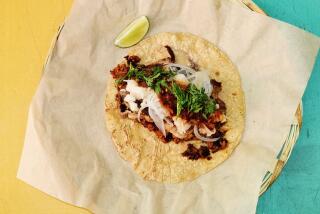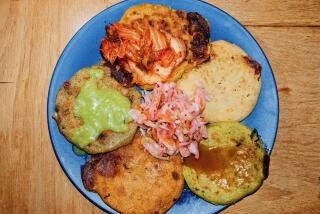Salvador, Golly!
El Izalqueno, which has 180-odd dishes on the menu, is the most ambitious Salvadoran restaurant in an area that breeds Salvadoran restaurants the way Melrose does Italian joints. Most other Salvadoran places serve pupusas made from corn and stuffed with meat or cheese, or sometimes with the mildly bitter flower buds called loroco . El Izalqueno has all of these, plus pupusas made from rice flour. Where you can find an atol or two anywhere else, El Izalqueno offers a half-dozen varieties of the warm gruel, including a delicious sweet one made with corn, pineapple and cloves, and a fine version of the savory chocolate/black-bean/pumpkin-seed model called shuco that at other restaurants is thin and uninteresting. Atols are served here in dried-out calabash halves that are kept from tipping over with little twine-wrapped rings. It feels pretty authentic. You can get all your favorite Salvadoran innard dishes here as well, and a spicy, exemplary sopa de pata, calves-foot soup, which as the menu proudly points out, is El Salvador’s most famous dish.
Seen briefly through the windshield of a moving car, El Izalqueno has a certain film-set improbability about it, a vivid neon-sign volcano silently erupting on a grimy stretch of Pico, a warm and friendly place glimpsed through the haze of gang graffiti on its windows--like some fake exterior plastered on a downtown place for an episode of “Law and Order.” Though the restaurant is around the corner from the genteel Victorian mansions of Alvarado Terrace, probably L.A.’s poshest residential street circa 1903, this is the sort of neighborhood where you’re glad to find a guarded parking lot after dark.
Inside, the dining room feels good, fragrant with frying onions, bedecked with Salvadoran paintings, anchored by a soccer trophy that reaches almost to the ceiling. It echoes with soul music from an extremely well-stocked jukebox at one end of the room. There are beer signs here like you wouldn’t believe, and silk flowers galore. And the menu itself is a fairly amazing document, thick as the fall-fashion issue of Vogue and shaped like a volcano (Izalqueno is a volcano in central El Salvador), illustrated with scenes of village life and spiked with directives on what to eat as a hangover cure, a restorative on a cold morning or as a macho tonic.
To start, you might try pastelitos de carne , delicious, crisply fried cornmeal turnovers stuffed with a savory mush of meat-and-veg, like what the Argentines call empanadas . . . or what Salvadorans call empanadas , which are deep-fried banana bundles filled with a sort of sweet pudding. A tostada de asada is about what you’d expect, a fried tortilla topped with beans, lettuce and peppery bits of well-done steak, but tostada de platanos is a plateful of thinly sliced green plantain chips with crumbles of aged Salvadoran cheese--not that interesting by themselves, but nice implements for scooping up salsa. What El Izalqueno calls Salvadoran guacamole, is chunky, well-seasoned avocado dip with lots of chopped-up hard-boiled egg in it. Salvadoran tamales are the wet, tasty kind, steamed in banana leaves and stuffed with beef or chicken and vegetables.
One of the best appetizers--though the menu implies that it’s an entree--is the grilled chorizo sausage, three tiny ones tied off with bits of corn husk to an order, that taste of black pepper and tart spice and char, and are served with the house’s good refried beans and a sour lake of Salvadoran cream. It’s sort of a rootsy version of the kind of thing you’d pay $8 for at Border Grill.
The oddest dish in the restaurant is the batter-fried pacaya flower, a really bitter thing filled with stamens that look like fat, white worms, sort of too weird for many people to actually eat. Arroz a la Valenciana , a Salvadoran take on paella , includes chicken, tomatoes, capers and little rounds of what appeared to be sliced hot dogs. Arroz con camarones , rice with shrimp, is very nice, with a subtle marine flavor and a dose of garlic, and torta de carne de puerco --chopped pork patties fried in an egg batter and doused with a sweet-and-sour tomato sauce--are tasty in a bogus, egg fu yung sort of way.
And then there’s gallo en chicha , which is rooster stewed in white wine with olives, capers and tomatoes, given a haunting, Southwest France-style sweetness with . . . prunes. It’s the cosmopolitan Salvadoran equivalent of coq au vin.
El Izalqueno, 1830 W. Pico Blvd., Los Angeles, (213) 387-2467. Open daily 10 a.m. to 10 p.m., Friday and Saturday to 11 p.m. Cash only. Beer and wine. Guarded lot parking in rear. Dinner for two, food only, $9-$16.
More to Read
Eat your way across L.A.
Get our weekly Tasting Notes newsletter for reviews, news and more.
You may occasionally receive promotional content from the Los Angeles Times.











